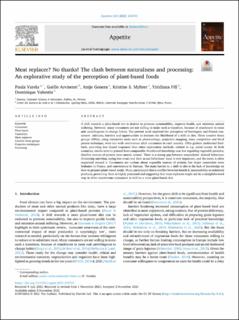Meat replacer? No thanks! The clash between naturalness and processing: An explorative study of the perception of plant-based foods
| dc.contributor.author | Varela, Paula | |
| dc.contributor.author | Arvisenet, Gaëlle | |
| dc.contributor.author | Gonera, Antje | |
| dc.contributor.author | Myhrer, Kristine S. | |
| dc.contributor.author | Fifi, Viridiana | |
| dc.contributor.author | Valentin, Dominique | |
| dc.date.accessioned | 2022-01-19T12:36:08Z | |
| dc.date.available | 2022-01-19T12:36:08Z | |
| dc.date.created | 2021-12-21T11:54:03Z | |
| dc.date.issued | 2022 | |
| dc.identifier.citation | Appetite. 2022, 169 1-10. | |
| dc.identifier.issn | 0195-6663 | |
| dc.identifier.uri | https://hdl.handle.net/11250/2838260 | |
| dc.description.abstract | A shift towards a plant-based diet is desired to promote sustainability, improve health, and minimize animal suffering. However, many consumers are not willing to make such a transition, because of attachment to meat and unwillingness to change habits. The present work explored the perception of Norwegian and French consumers' attitudes, barriers and opportunities to increase the likelihood of a shift in diet. Three creative focus groups (CFGs), using interactive tasks such as photo-collage, projective mapping, story completion and third person technique, were run with omnivorous adult consumers in each country. CFGs gathers undirected feedback, providing less biased responses than other exploration methods, related to e.g. social norms. In both countries, results were in general lines comparable. Nutritional knowledge was low regarding vegetable proteins; familiar sources of protein were mostly animal. There is a strong gap between respondents’ desired behaviour (balancing nutrition, eating less meat) and their actual behaviour: meat is very important, and the menu is often organized around it. Consumers are curious about vegetable sources of protein, but major constraints were hedonics in France, and convenience in Norway. The main barrier to a shift in diet is the lack of knowledge on how to prepare plant-based meals. Many participants find a conflict between health & sustainability in industrial products, perceiving them as highly processed and suggesting that meat replacers might not be a straightforward way to drive omnivorous consumers to shift to a more plant-based diet. | |
| dc.language.iso | eng | |
| dc.subject | Consumers | |
| dc.subject | Consumers | |
| dc.subject | Plant based food | |
| dc.subject | Plant-based food | |
| dc.subject | Creative focus groups | |
| dc.subject | Creative focus groups | |
| dc.subject | Meat replacers | |
| dc.subject | Meat replacers | |
| dc.subject | Vegetarian | |
| dc.subject | Vegetarian | |
| dc.title | Meat replacer? No thanks! The clash between naturalness and processing: An explorative study of the perception of plant-based foods | |
| dc.type | Peer reviewed | |
| dc.type | Journal article | |
| dc.description.version | publishedVersion | |
| dc.source.pagenumber | 1-10 | |
| dc.source.volume | 169 | |
| dc.source.journal | Appetite | |
| dc.identifier.doi | 10.1016/j.appet.2021.105793 | |
| dc.identifier.cristin | 1970974 | |
| dc.relation.project | Nofima AS: 202103 | |
| dc.relation.project | Norges forskningsråd: 314318 | |
| dc.relation.project | Norges forskningsråd: 267858 | |
| dc.relation.project | Nofima AS: 11946 | |
| cristin.ispublished | true | |
| cristin.fulltext | original | |
| cristin.qualitycode | 1 |
Tilhørende fil(er)
Denne innførselen finnes i følgende samling(er)
-
Artikler / Articles [1471]
-
Publikasjoner fra CRIStin [2553]
